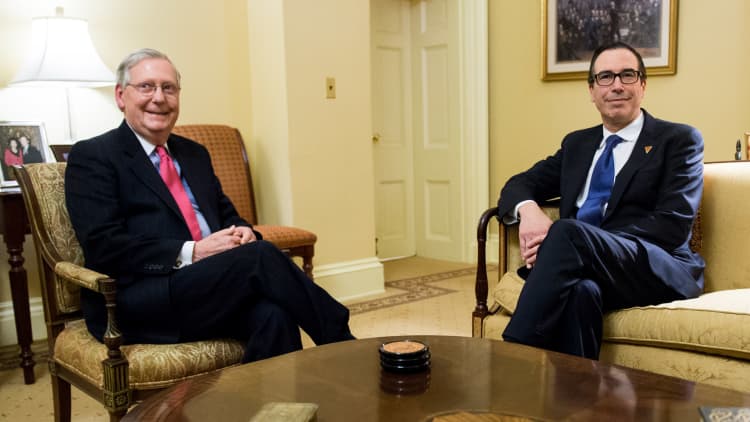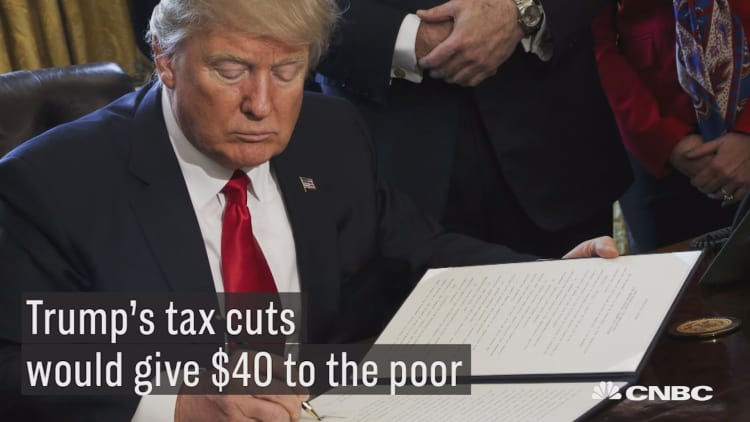
A corporate tax reform plan is likely to take shape sometime this fall and be signed into law next year, regardless of what happens with congressional efforts to replace Obamacare.
Tax reform and tax breaks have been a key part of the Trump agenda, but expectations for legislation have faded amid congressional wrangling over health care and the constant headlines around investigations into the Trump campaign's ties to Russia.
What appears to be emerging from behind-the-scenes work on tax reform by Congress and the Trump administration is a smaller tax cut for corporations than originally desired but reforms that should level some of the playing field for U.S. companies. For individuals, there may be smaller tax breaks as well, with a focus on cuts for lower- and middle-class taxpayers.
Political strategists say the negotiations should ultimately lead to tax legislation for corporations and individuals next year, even if efforts to reform the Affordable Care Act fail.
"We think taxes are different than health care. We think there are lessons learned from health care. It's not easy," said Daniel Clifton, head of policy research at Strategas. "The Russia story has made it harder to do, but we're confident the fourth quarter is going to be very focused on tax reform, with completion in the first quarter."
He added: "There's a lot of progress being made on tax reform, and it's all being done behind the scenes. They're trying to work out the thornier issues of tax reform so they avoid the problems they're having on health care."
Replacing the Affordable Care Act, also called Obamacare, was set as a priority by Republicans ahead of tax reform because it was expected to save money that could be applied to tax breaks. Senate Majority Leader Mitch McConnell this week delayed the Senate's recess by two weeks so that efforts on health care could continue. GOP senators rolled out their revised health-care bill on Thursday.
Clifton said there's less than a 50 percent chance that the current health-care bill passes the Senate, and strategists say health care ultimately may have to be addressed in a dual effort with Democrats.
"The health-care bill is not in a good place right now," Clifton said. "What it does is it provides more money to stabilize the exchanges, and that's for the moderates. For the conservatives, it allows health insurers to offer plans that are not now ACA compliant ... a more slimmed down, cheaper plan. Those are the two big changes. They took out the tax cut so they could not be accused of cutting taxes for the wealthy, while cutting Medicaid for the poor. They put money in for opioids, about $40 billion, and they made no changes to [cuts to] Medicaid."
Tax reform will likely fall short of the big breaks initially proposed by the House or the 15 percent corporate tax rate pushed by President Donald Trump. Based on early proposals, the new corporate tax rate could be about 23 percent.

The current tax rate is 35 percent, and S&P 500 companies pay an average 25 percent corporate rate currently. The House earlier proposed a 20 percent tax rate, but there are no longer expectations for a border adjustment tax, a controversial tax change that would have been a big revenue generator in the House bill.
For individuals, the more controversial elements, like the elimination of deductions for such things as real estate taxes and charitable giving, are not expected to be part of it, Clifton said.
"I keep hearing from people the tax bill is dead. I don't think the tax bill is dead. It's not going to be as big as Donald Trump wanted, but it's not dead," said Greg Valliere, chief global strategist at Horizon Investments.
He said the House could have a bill by September and approve it by the end of this year, but it will take a while to work through the Senate and then conferences. It could be approved by late winter or early spring. "There have been meetings, not well publicized with [Treasury Secretary Steven] Mnuchin, [House Speaker Paul] Ryan, [Rep. Kevin] Brady and [Sen. Orrin] Hatch. A lot the of key players are talking and they are laying the ground work," he said.
As in earlier plans, there is a proposal for repatriation of overseas corporate profits and a territorial tax. That would mean companies would not pay U.S. taxes on future profits brought back from overseas, which are already taxed locally, Clifton said.
He said there is also a proposal for a mandated one-time repatriation of overseas corporate cash, taxing it at 8.5 percent, as well as a much lower tax of 3.5 percent on profits that were already reinvested overseas. He also said companies could be taxed on intellectual property overseas.
Things like patents, trademarks, copyrights and other intangibles that U.S. companies had preferred to be taxed at lower rates overseas would be subject to a U.S. tax rate of possibly 8 or 9 percent, Clifton said. He also said there are discussions that non-U.S. companies could be subject to a new tax, which would make it more expensive to do business, since it would limit their ability to deduct things like interest, rent and royalties. This would be to discourage companies from changing their domicile to avoid higher U.S. taxes.
The deductibility of interest may also be changed so that companies would be limited on how much they could deduct, Clifton said. This would affect the most indebted companies.
Strategists say a big winner in tax reform would be small businesses, which could fall under the new corporate tax rate instead of paying taxes at higher individual tax rates.
Tom Block, Washington policy strategist at Fundstrat, said there is a big motivation for Congress to move quickly on tax reform. There have been concerns Republicans could lose their House majority next year in midterm elections if they don't push the Trump agenda forward.
"I think it goes to the president's desk fourth quarter this year, first quarter next year. They've got to do it before primary season kicks in," he said. "I think the focus is going to be on business taxes. It's close to unanimity that our corporate tax rate is too high. Where personal taxes come in is seeing if they can carve out something for small businesses."
Block said it's quite possible current Republican House members could be challenged by more conservative candidates in their districts if they take no action on taxes.
Block expects that the current health-care bill will fail. "My view is it falls apart next week. Then they sit down with the Democrats and they try very hard to come up with something that helps a little bit," he said.
Strategists say the tax reform efforts could also be sidelined while Congress attempts to come up with a budget resolution this fall, as well as deal with the debt ceiling, a legislative limit on how much the federal government can borrow.
"The debt ceiling has a lot of House conservatives thinking about making some mischief," Valliere said. Strategists say a bipartisan effort may be needed to raise the debt ceiling.
"The key is getting a budget resolution. When you get that you will then have instructions for a tax bill," he said. "The budget resolution in September is crucial for this whole process."
With the budget resolution, the Senate would need only a 51 percent majority to approve tax reform.
WATCH: Trump's tax cuts would really benefit ultrarich



